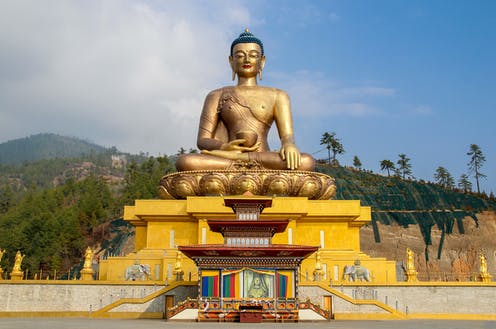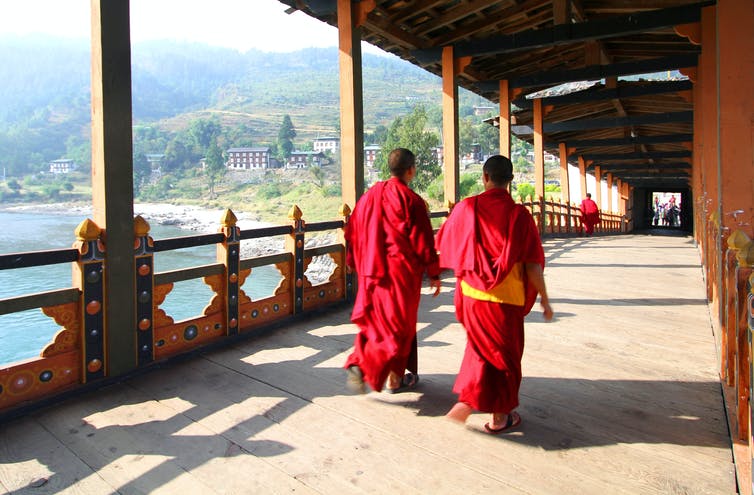
NiarKrad/Shutterstock
Nearly half the world’s population has received at least one dose of a COVID-19 vaccine. But figures vary widely between countries. Many low and middle-income countries have barely started their vaccination campaigns.
But the tiny Himalayan nation of Bhutan isn’t one of them. By the end of July, it had fully vaccinated 90% of its adults. Despite having few doctors and nurses, across just three weeks in the summer it delivered a second vaccine dose to nearly every adult in the country. This is a remarkable success story for one of the least developed countries in the world.
Health minister Dechen Wangmo credits solidarity, Bhutan’s small size and its science-based policymaking for its success. Its achievement highlights how logistical challenges and vaccine hesitancy can be overcome.
Table of Contents
Donations are crucial
Bhutan’s success wouldn’t have been possible without international cooperation. Its first vaccines were donated by India. By March 2021, India had sent 450,000 doses of the AstraZeneca vaccine, enough to give all eligible adults in Bhutan their first dose in the spring.
But getting hold of second doses was a challenge. India’s second wave soon arrived, causing it to prioritise domestic immunisations and ban vaccine exports. Bhutan’s immediate source of doses had dried up, while India’s mounting caseload over the border posed a rapidly increasing infection risk.
After a tense wait, 500,000 doses of the Moderna vaccine came from the US through Covax, the vaccine-sharing initiative. An additional 250,000 doses of the AstraZeneca vaccine came from Denmark, followed by supplies of AstraZeneca, Pfizer and Sinopharm vaccines from Bulgaria, Croatia, China and other countries.
Planning makes the logistics work
Distribution was another big part of the puzzle. Bhutan is remote. Land access is only possible on a few roads from India. The Covax vaccines arrived by air at Paro International Airport. One of the most challenging landings in the world, Paro sits in a deep valley. The surrounding peaks are as high as 5,500 metres.
Domestic transport is also challenging. Bhutan’s population of almost 750,000 is scattered over an area roughly the size of Switzerland. Not all of the mountainous country is accessible by road.
Because of this, the health ministry had to plan in detail how to get all adults their first and second doses as quickly as possible. This involved extensive field visits to remote districts, to map where people were and identify possible vaccination sites. The visits also established ways of supplying these sites – by road, air or even on foot for the most inaccessible areas.
Schools, monasteries and other public buildings were used as vaccination centres. Keeping vaccines sufficiently cold at smaller locations could be challenging, so district hubs were created across the country to store vaccines and coordinate distribution to smaller sites as doses were needed. Domestic flights and a helicopter shuttle service were used to move doses around the country.
And a digital platform – the Bhutan Vaccination System – helped speed up the rollout of second doses. It allowed people to pre-register online before receiving their jab and so not waste time filling in personal details at the vaccine centre.

US Department of State
User research was also central to Bhutan’s planning phase. The health ministry ran online conferences with healthcare workers and authorities at district and village level to highlight expected challenges. Simultaneously, the ministry mobilised and trained healthcare workers to vaccinate and monitor patients.
But with only 376 doctors in the country, the planning phase soon identified a shortage of medical personnel. So 50 registered doctors known to be studying overseas were recalled.
Nurses and healthcare workers were supported by the “Guardians of the Peace” – a part volunteering, part national service programme that has been run in Bhutan for the last decade and has 4,500 members. These guardians encouraged people to get vaccinated and helped manage vaccine centres.
Set a good example
Good leadership has also been a hallmark of Bhutan’s vaccine rollout. There are high levels of trust in the country’s political leaders. This has been helped during the pandemic by the government having two doctors and two public health experts in its 11-member cabinet. The prime minister and the health minister have spent substantial time on the national response to COVID-19.
The role of King Jigme Khesar Namgyel Wangchuck should also not be underestimated. While Bhutan became a constitutional monarchy in 2008, transitioning to having a democratically elected government, the king is still much revered. His presence has been felt throughout the country, as he has travelled to remote settlements to oversee protection measures.
One such journey was a five-day trek to meet and thank healthcare workers. Leading by example, he quarantines in a hotel whenever he returns to the capital.
Bhutan’s politicians also engaged with the public to overcome vaccine hesitancy. A survey studied the public’s concerns, with the government’s response focusing on communicating the science behind the vaccine. Uptake was promoted by social media influencers and television and film personalities.
Cultural sensitivity was also crucial to ensuring public support. For example, Buddhist monks determined when to roll the vaccines out and picked the most auspicious time (the majority of the population is Buddhist). Monks also determined that the first dose should be administered by a women and given to a women born in the Year of the Monkey.

Wantanee Chantasilp/Shutterstock
Not every country can achieve what Bhutan has. Having a small population and high trust in authorities facilitated this rollout. But Bhutan demonstrates that a fast and equitable vaccine rollout is possible in low and middle-income countries.
What’s clear is that the international community has to work together on the provision of vaccines. Support may also be needed to manage distribution, as getting doses to remote parts of the world’s least developed countries is a huge challenge. Bhutan, though, should offer encouragement that meeting it is possible.
![]()
The authors do not work for, consult, own shares in or receive funding from any company or organization that would benefit from this article, and have disclosed no relevant affiliations beyond their academic appointment.
























